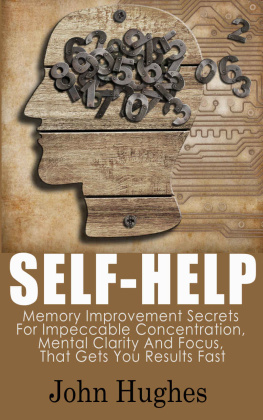THE BRAIN HEALTH
& BETTER MEMORY BOOK
IMPROVE FOCUS, MEMORY RECALL, AND PREVENT DEMENTIA
Howard VanEs, M.A.
The Brain Health & Better Memory Book
Improve Focus, Memory Recall, and Prevent Dementia
Howard VanEs, M.A.
Published by:
BooksOnHealth.net
ISBN: 978-0692392218
Copyright 2015 by Howard VanEs. All rights reserved. Unless otherwise noted, no part of this book may be reproduced, stored in a retrieval system, transmitted in any form or by any means, electronic, mechanical photocopying, or recording without express written permission from the author, except for brief quotations or critical reviews.
Disclaimer: The information and ideas presented in this book are for educational purposes only. This book is not intended to be a substitute for consulting with an appropriate health care provider. Any changes or additions to your medical care should be discussed with your physician. The author and publisher disclaim any liability arising directly or indirectly from this book.
TABLE OF CONTENTS
Chapter 1 - The big picture:
what affects our brains
Chapter 2 - A look inside:
how our brains age
Chapter 3 - Food for thought:
how diet affects brain health
Chapter 4 - A little extra help:
supplements
Chapter 5 - Move it or lose it:
exercise and brain health
Chapter 6 - This is your brain;
this is your brain on stress
Chapter 7 - We are social animals:
the importance of social connections
Chapter 8 - ZZZZZs:
sleep is very good for your brain
Chapter 9 - Om:
yoga as an antidote to aging

Your brain plays a
major role in almost
everything you do.
INTRODUCTION
T he human brain is an amazing and fascinating organ. It weighs in at approximately 3 percent of your body weight and receives one quarter of its blood flow. Interestingly, there are no two brains alike in the world. Your interpretation of the last hit on the radio differs from how other people experience it, and the same goes for anything you read, see, or experience.
Your brain plays a major role in almost everything you do including thinking, feeling, communicating, breathing, remembering, working, playing, sleeping, etc. Vital to the quality of life, therefore, is maintaining or improving the health of your brain.
The reduction or loss of brain function can result in any number of problems, including forgetfulness, moodiness, insomnia, lack of problem-solving skills, and an inability to communicate effectively. When brain health deterioration becomes more severe, it can lead to dementia and the problems associated with this serious decline, including confusion, difficulty understanding visual images, changes in personality, trouble remembering, hallucinations, and lack of judgment.
As we mature, there are any number of factors that can affect your overall brain health and memory, including health issues, medications, diet, activity/exercise, stress levels, sleep or lack of it, social connections, and how mentally active you are. This book will address these issues, explaining how each impacts the health of your brain, and then offer ideas, tips, and tools to optimize the health of your brain and your memory.

Chapter 1

THE BIG PICTURE
WHAT AFFECTS OUR BRAINS

As you age, the toll
of all the nutrition
choices you made
throughout your life
is reflected in your
brains health.
T he health of our brains are influenced by a number of different factors and this chapter will give you a brief overview of them. Subsequent chapters will go into more detail.
Influence of diet on brain health
From the moment you are born, the growth of your brain is heavily dependent on your diet. Fats and proteins are the building blocks used by the brain to expand all its nerve cells, called dendrites. The nervous system is kind of like a network connecting various parts through electrical impulses. Myelin, a fatty substance, is the covering material for all of the nervous system, which facilitates proper signal transmission. Diseases such as multiple sclerosis (MS), are known as demyelinating diseases since their critical feature is the loss of the insulating material, the myelin, on the nerve fiber. Currently, studies are raising concerns about signs that more and more children are displaying a reduction in myelin, a result attributed to an emphasis on fat-free diets.
As you age, the toll of all the nutrition choices you made throughout your life is reflected in your brains health. In chapter three, the role of nutrition is explored more fully including which foods detract from brain health and which nutrients should be included in your diet to optimize brain function.
Medications
Many commonly prescribed medications interfere with brain health and memory, and for chronic users, the damage of these drugs can be severe and very dangerous. The top three drug families that can affect your brain are:
1) Anti-anxiety drugs: Benzodiazepines, for example, reduce activity in parts of the brain and have a sedative effect as well as muscle relaxing properties. Prone to cause tolerance, chronic users of benzodiazepines are at a greater risk of suffering from many side effects, which include dizziness, lightheadedness, impaired thinking and judgment, memory loss, nausea, stomach upset, and blurred or double vision.
Examples of drugs in this category: Alprazolam (Xanax), chlordiazepoxide (Librium), clonazepam (Klonopin), diazepam (Valium), flurazepam (Dalmane), lorazepam (Ativan), midazolam (Versed), quazepam (Doral), temazepam (Restoril) and triazolam (Halcion)
2) Cholesterol lowering drugs: Statins can lower blood levels of cholesterol, which in turn can impair memory as well as other mental processes. As discussed earlier, fats and lipids are essential for the nervous system, and their reduction can lead to adverse cognitive effects. It is also important to note that there is a long list of other possible side effects of statins.
Examples of drugs in this category: Atorvastatin (Lipitor), fluvastatin (Lescol), lovastatin (Mevacor), pravastatin (Pravachol), rosuvastatin (Crestor) and simvastatin (Zocor).
3) Hypertension drugs: Beta-blockers function by reducing the heart rate and lowering blood pressure. Side effects can include dizziness, insomnia, fatigue, loss of sex drive, depression, and digestive disorders.
Examples of hypertensive drugs: Atenolol (Tenormin), carvedilol (Coreg), metoprolol (Lopressor, Toprol), propranolol (Inderal), sotalol (Betapace), timolol (Timoptic).
If you are currently taking any of the above-mentioned medications, you may want to consult with your physician regarding their side effects, and the side effects of the side effects. For example, insomnia in itself can cause brain deterioration.
Next page










